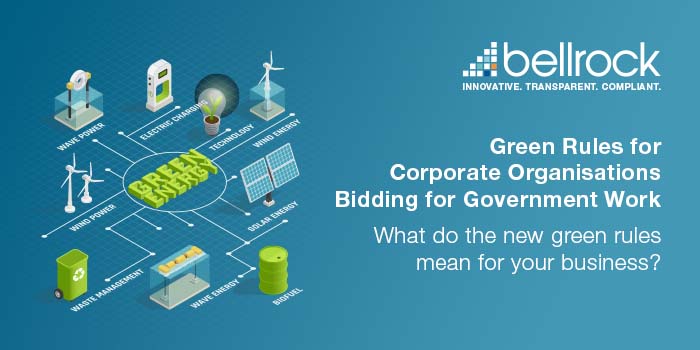Green Rules for Corporate Organisations Bidding for Government Work
The UK government recently introduced new rules regarding corporate companies when they bid for major government contracts. The rules stipulate that all companies bidding for government contracts worth more than £5 million per year must commit to achieving net zero emissions by 2050.
This change outlines that the carbon net zero targets are not an option, they are mandatory, and the new rules show that the government is taking measures to ensure companies comply with the rules or their business will be significantly affected.
What do the new green rules mean for my business?
The rules are designed to ensure that the largest organisations are making the necessary changes to reduce their carbon footprint, while also helping small and medium-sized businesses to win work from the government.
All companies bidding for governmental contracts worth more than £5 million a year will be required to commit to achieving net zero by 2050. This applies to companies who win the contracts as well as the ones who lose out with their bids. The UK is the first country to introduce a measure like this to drive the green agenda, and it is hoped that other countries will follow the approach.
With the government spending £290bn a year on procurement, they are using their spending power to enforce large companies to work harder towards fighting climate change. Some large companies are already required to self-report their carbon emissions as part of the Streamlined Energy and Carbon Reporting Regulations published in 2018 and this additional measure will help to ensure companies step up their actions in reducing their carbon footprint.
Under the new rules, companies will be required to report on some Scope 3 emissions which include business travel, employee commuting, transportation, distribution, and waste for the first time.
Learn more about the procurement of FM within the public sector here.
How to become compliant with the new rules
Organisations should start by using a carbon footprint calculator to assess what their current carbon footprint measurement is, and which areas of business operations require significant intervention. From reducing waste to increasing the rate of reuse and recycling, and elimination of single-use plastic, there are lots of ways to make important changes to reduce emissions.
In the construction industry, the transportation of materials is an area that contributes largely to the carbon footprint and one solution could be to source materials locally whenever possible. Switching to green fuels is another important step in reducing carbon emissions, as well as sizing trucks correctly so that loads are transported more efficiently. Regular maintenance of both vehicles and construction equipment can help to ensure that they operate as efficiently as possible.
Sourcing materials that are recycled will also help to significantly reduce carbon emission levels and this saves materials from going into landfill.
Monitoring and reducing energy use in buildings is another area to focus on to help demonstrate the commitment to achieving carbon net zero by 2050.
For further information on sustainability, read our blog on ‘Meeting Carbon Net Zero Targets’.
How Bellrock can support your energy and sustainability needs
Bellrock has been delivering highly effective sustainability initiatives for many years and supporting our clients in reducing their carbon footprint through sharing best practices for carbon and waste reduction initiatives and other key green solutions. We have also set up several carbon offsetting projects such as forest protection in Zimbabwe and conservation projects.
Our software solution, Concerto, is integral for monitoring and reducing energy consumption and designing green buildings, as all our software is aligned to driving down carbon emissions across all areas of a business.
Contact us today to find out more and obtain expert sustainability advice on how you can comply with the new rules and win more government contracts.




